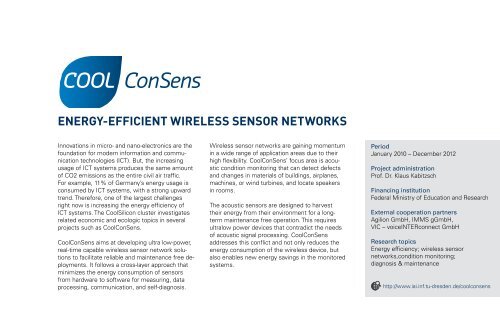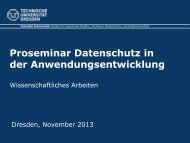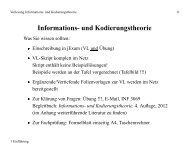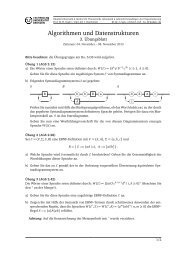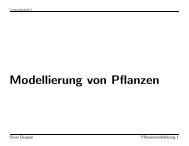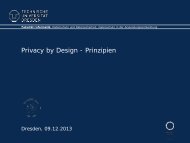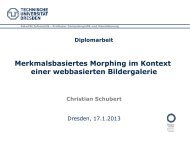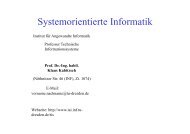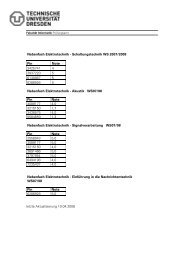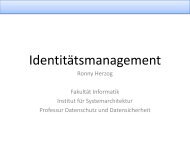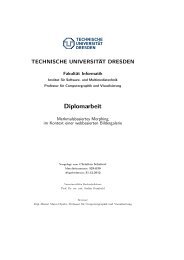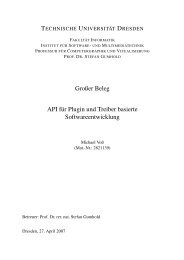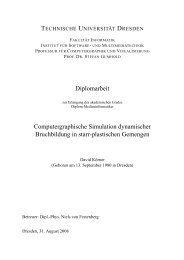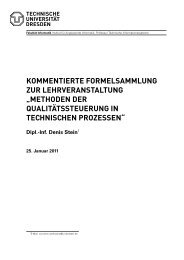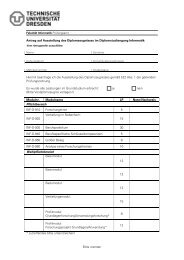faculty of computer science - Fakultät Informatik - Technische ...
faculty of computer science - Fakultät Informatik - Technische ...
faculty of computer science - Fakultät Informatik - Technische ...
You also want an ePaper? Increase the reach of your titles
YUMPU automatically turns print PDFs into web optimized ePapers that Google loves.
Energy-Efficient Wireless Sensor Networks<br />
Innovations in micro- and nano-electronics are the<br />
foundation for modern information and communication<br />
technologies (ICT). But, the increasing<br />
usage <strong>of</strong> ICT systems produces the same amount<br />
<strong>of</strong> CO2 emissions as the entire civil air traffic.<br />
For example, 11% <strong>of</strong> Germany’s energy usage is<br />
consumed by ICT systems, with a strong upward<br />
trend. Therefore, one <strong>of</strong> the largest challenges<br />
right now is increasing the energy efficiency <strong>of</strong><br />
ICT systems. The CoolSilicon cluster investigates<br />
related economic and ecologic topics in several<br />
projects such as CoolConSens.<br />
CoolConSens aims at developing ultra low-power,<br />
real-time capable wireless sensor network solutions<br />
to facilitate reliable and maintenance free deployments.<br />
It follows a cross-layer approach that<br />
minimizes the energy consumption <strong>of</strong> sensors<br />
from hardware to s<strong>of</strong>tware for measuring, data<br />
processing, communication, and self-diagnosis.<br />
Wireless sensor networks are gaining momentum<br />
in a wide range <strong>of</strong> application areas due to their<br />
high flexibility. CoolConSens’ focus area is acoustic<br />
condition monitoring that can detect defects<br />
and changes in materials <strong>of</strong> buildings, airplanes,<br />
machines, or wind turbines, and locate speakers<br />
in rooms.<br />
The acoustic sensors are designed to harvest<br />
their energy from their environment for a longterm<br />
maintenance free operation. This requires<br />
ultralow power devices that contradict the needs<br />
<strong>of</strong> acoustic signal processing. CoolConSens<br />
addresses this conflict and not only reduces the<br />
energy consumption <strong>of</strong> the wireless device, but<br />
also enables new energy savings in the monitored<br />
systems.<br />
Period<br />
January 2010 – December 2012<br />
Project administration<br />
Pr<strong>of</strong>. Dr. Klaus Kabitzsch<br />
Financing institution<br />
Federal Ministry <strong>of</strong> Education and Research<br />
External cooperation partners<br />
Agilion GmbH, IMMS gGmbH,<br />
VIC – voiceINTERconnect GmbH<br />
Research topics<br />
Energy efficiency; wireless sensor<br />
networks,condition monitoring;<br />
diagnosis & maintenance<br />
http://www.iai.inf.tu-dresden.de/coolconsens


